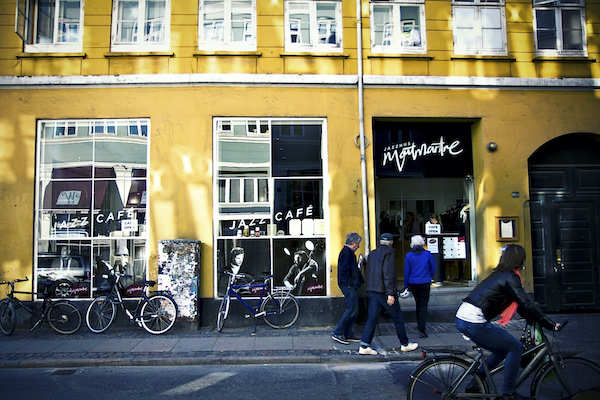Jan 13, 2026 2:09 PM
More Trump-Kennedy Center Cancellations
The fallout from the renaming of the John F. Kennedy Center for the Performing Arts to include President Donald…

Copenhagen’s Jazzhus Montmartre received no-strings-attached grant funding from its local city council, enabling the venue to soldier on amid the protracted coronavirus pandemic.
(Photo: Courtesy Jazzhus Montmartre)Before the pandemic brought live music to a halt in March, Jazzhus Montmartre in Copenhagen was riding high.
“There’s a lot of history in those walls, and the period up to COVID-19 was really record-setting,” Jazzhus Montmartre CEO Jonas Dyrved told DownBeat via Zoom in September. The 85-seat club—where titans like Cecil Taylor, Dexter Gordon, Rahsaan Roland Kirk and Bill Evans played and recorded in the ’50s and ’60s—was presenting about 200 shows a year, and had just launched a children’s program, as well as a series of sold-out concerts featuring a new wave of young jazz players.
Twins Jazz in Washington, D.C., also seemed to be on sure footing before the pandemic. Originally opened in 1987 by Kelly and Maze Tesfaye—two immigrant sisters—as an Ethiopian restaurant, Twins eventually grew into a 75-seat jazz club that became a mainstay of the U Street Black cultural corridor. It presented national acts like Reggie Workman, produced concerts at larger venues for legends like Gil Scott-Heron and also served as a showcase for emerging D.C. artists.
“There was a big buzz when we opened the new Twins location in 2000, because it was just around the corner from Howard University,” recalled Twins spokesperson Layla Nielsen, who’s helping to steer her family-run business through the crisis, while running her own digital marketing company. “So, we had a lot more younger enthusiasts coming through, and we were packed every weekend.”
Future prospects faded on both sides of the Atlantic during the spring lockdown. While Jazzhus Montmartre briefly re-emerged with livestreams in June, the novelty quickly wore off and donations only provided a fraction of what was needed to cover costs. “It’s always been really important to pay our musicians well,” Dyrved said.
The prognosis is somewhat brighter in New York, where clubs from the Blue Note and the Village Vanguard to more intimate spaces like Smalls and The Jazz Gallery are reinventing themselves digitally. Smalls reorganized as the nonprofit SmallsLIVE Foundation and, buoyed by a Paycheck Protection Program loan and a $25,000 grant from Billy Joel, began streaming live shows from the club in April. The Jazz Gallery successfully morphed into TJGOnline, launching an ambitious program of ticketed livestreams, archival performances and artist interviews.
But with the odds stacked against them, Jazzhus Montmartre and Twins decided to close their doors. By early September, both clubs had announced they were unable to weather the pandemic, sending a gust of reality throughout a global jazz community already on dangerously thin ice.
Then on Sept. 24, Copenhagen city council approved special coronavirus grants for four nonprofit venues, including Jazzhus Montmartre, which are intended to cover operational costs and musician fees for the next four years. Unlike a loan, this no-strings-attached grant doesn’t have to be repaid and ensures the club about $155,000 annually from the city alone. Bolstered by an anonymous donation, which was contingent on the public funding, Jazzhus Montmartre could produce 150–200 concerts annually for the next four years, while continuing its outreach programs with schools and conservatories.
“We are very happy and blessed to be able to start having live concerts again in November,” Dyrved enthused in an email, while noting that a spike in new cases could change the situation. “With [the current] restrictions, we can have approximately 35 guests per show, and we hope to do hybrid concerts with streaming as well. Live music is really where the magic happens, so this is very important for the club, the musicians and the audience.”
The future’s less certain for Twins in the States, where public support for the arts has dwindled over the years. And though the National Independent Venue Association said it boasts more than 2,000 members and has rallied allies across multiple industries for its Save Our Stages initiative, the bipartisan RESTART Act seems to have stalled in Congress.
NIVA has predicted widespread venue closings, forecasting 90% of its member clubs could be shuttered if federal funds don’t become available.

Belá Fleck during an interview with Fredrika Whitfield on CNN.
Jan 13, 2026 2:09 PM
The fallout from the renaming of the John F. Kennedy Center for the Performing Arts to include President Donald…

Peplowski first came to prominence in legacy swing bands, including the final iteration of the Benny Goodman Orchestra, before beginning a solo career in the late 1980s.
Feb 3, 2026 12:10 AM
Ken Peplowski, a clarinetist and tenor saxophonist who straddled the worlds of traditional and modern jazz, died Feb. 2…

The success of Oregon’s first album, 1971’s Music Of Another Present Era, allowed Towner to establish a solo career.
Jan 19, 2026 5:02 PM
Ralph Towner, a guitarist and composer who blended multiple genres, including jazz — and throughout them all remained…

Rico’s Anti-Microbial Instrument Swab
Jan 19, 2026 2:48 PM
With this year’s NAMM Show right around the corner, we can look forward to plenty of new and innovative instruments…

Richie Beirach was particularly renowned for his approach to chromatic harmony, which he used to improvise reharmonizations of originals and standards.
Jan 27, 2026 11:19 AM
Richie Beirach, a pianist and composer who channeled a knowledge of modern classical music into his jazz practice,…